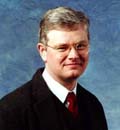Invited Talk by Prof. Louis Whitcomb: Extreme Robotics - Development of Hybrid Underwater Robotic Vehicles for Oceanographic Exploration
 |
Mechanical Engineering and Computer Science Johns Hopkins University, Baltimore, USA
|
Extreme Robotics - Development of Hybrid Underwater Robotic Vehicles for Oceanographic Exploration
Abstract:This talk reports a brief overview of the Nereus vehicle design, and reviews the initial results of the dives conducted on these expeditions, including two dives to more than 10,900m depth. In May/June 2009 Nereus successfully performed scientific observation and sampling operations at hadal depths of 10,903m on a NSF sponsored expedition to the Challenger Deep of the Mariana Trench – the deepest place on Earth. The Nereus underwater vehicle is designed to perform scientific survey and sampling to the full depth of the ocean – significantly deeper than the depth capability of all other present-day operational vehicles. For comparison, the second deepest underwater vehicle currently operational worldwide can dive to 7,000m maximum depth. In October 2009 the vehicle successfully performed autonomous survey and teleoperated sampling on a NASA sponsored expedition to the Mid-Cayman Rise. I will also discuss a new NSF sponsored project to develop a variant of Nereus for oceanographic operations in Polar marginal ice zones. The Nereus vehicle project is led by the Woods Hole Oceanographic Institution with collaboration of the Johns Hopkins University and the U.S. Navy. Bio:
Louis L. Whitcomb completed a B.S. in Mechanical Engineering in 1984 and a Ph.D. in Electrical Engineering in 1992 at Yale University. From 1984 to 1986 he was a Research and Development engineer with the GMFanuc Robotics Corporation in Detroit, Michigan. He joined the Department of Mechanical Engineering at the Johns Hopkins University in 1995, after post doctoral fellowships at the University of Tokyo and the Woods Hole Oceanographic Institution. His research focuses on the dynamics and control of robot systems – including industrial, medical, and underwater robots. Whitcomb is a principal investigator of the Nereus Project. He is founding Director of the JHU Laboratory for Computational Sensing and Robotics. Whitcomb is a Professor and the Louis R. Sardella Faculty Scholar at the Department of Mechanical Engineering, with secondary appointment in the Department of Computer Science, at the Johns Hopkins University’s Whiting School of Engineering. Whitcomb received teaching awards at Johns Hopkins in 2001, 2002, 2004, and 2011, and was awarded a National Science Foundation Career Award and an Office of Naval Research Young Investigator Award. He is a Fellow of the IEEE. He is also Adjunct Scientist, Department of Applied Ocean Physics and Engineering, Woods Hole Oceanographic Institution.
| WebEventForm | |
|---|---|
| Title: | Invited Talk by Prof. Whitcomb: Extreme Robotics - Development of Hybrid Underwater Robotic Vehicles for Oceanographic Exploration |
| Date: | 14 May 2013 |
| Location: | Room 00.13.009A; FMI-Building |
| Abstract: | This talk reports a brief overview of the Nereus vehicle design, and reviews the initial results of the dives conducted on these expeditions, including two dives to more than 10,900m depth. |
| Imageurl: |  |
| Type: | News |
| Videourl: | |
| Conferencelink: | |
